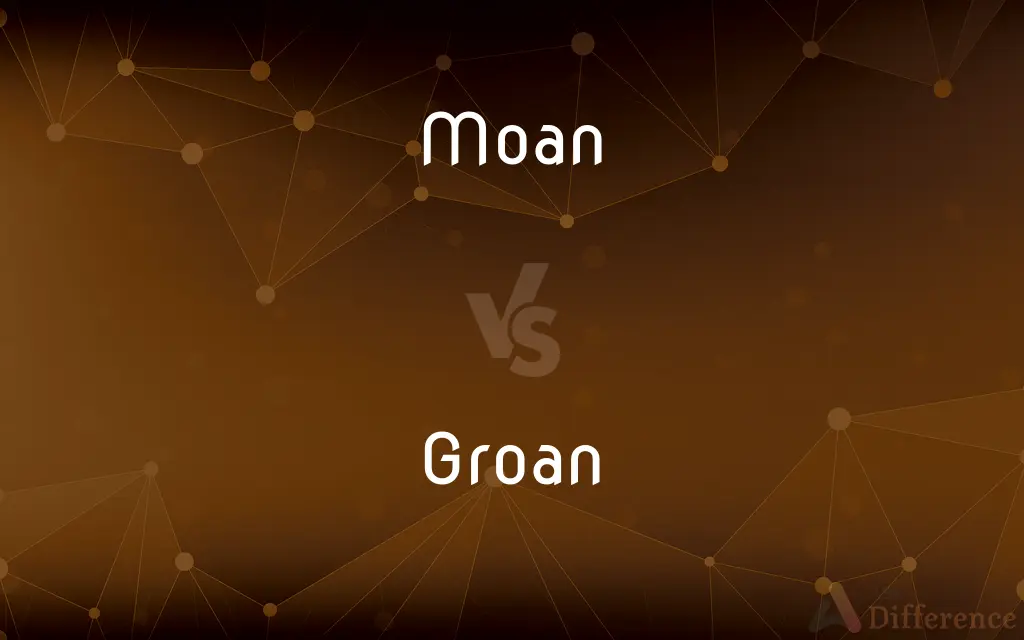Moan vs. Groan — What's the Difference?
By Tayyaba Rehman — Updated on September 18, 2023
A moan is a prolonged, low sound often expressing pain or pleasure. A groan is a deep sound conveying discomfort, annoyance, or effort. Both are vocal expressions, but they differ in the nuances of emotion they convey.

Difference Between Moan and Groan
Table of Contents
ADVERTISEMENT
Key Differences
A moan is typically a sound of longer duration that can express various emotions, from pleasure to sorrow. It can be involuntary, like when someone is hurt, or voluntary, signaling satisfaction. A groan, however, is more immediate and abrupt, often indicating sudden discomfort, displeasure, or strain.
When considering their common uses, a moan might be heard in contexts ranging from physical intimacy to expressing sympathy. It can signify both positive and negative feelings. In contrast, a groan is predominantly negative, associated with annoyance, pain, or the effort of lifting something heavy.
In literature and storytelling, a moan might be used to evoke feelings of sadness, haunting, or sensuality. Ghosts are often depicted as moaning in haunted places. A groan, on the other hand, might be used to portray exasperation, physical pain, or the burden of a situation.
The physical act of a moan is often softer, even when expressing pain, while a groan can be more forceful, reflecting a stronger, immediate reaction to a stimulus or situation.
Lastly, while both moan and groan are sounds that humans make, only "groan" is often used figuratively to describe non-human sounds, such as the "groaning" of floorboards or old machinery. "Moan" is more commonly reserved for human or living beings.
ADVERTISEMENT
Comparison Chart
Definition
A prolonged, low sound.
A deep sound conveying discomfort.
Emotion Conveyed
Can be pleasure, pain, or sorrow.
Predominantly discomfort, annoyance, or effort.
Common Usage
Contexts like intimacy or expressing sympathy.
Indicates pain, annoyance, or the effort of a task.
Intensity
Often softer in nature.
More forceful, reflecting a stronger reaction.
Association with Non-Humans
More commonly reserved for humans.
Used figuratively for non-human sounds like groaning floorboards.
Compare with Definitions
Moan
A long, low sound expressing pain.
She let out a moan when she stubbed her toe.
Groan
A sound expressing pain or discomfort.
He let out a groan when he lifted the heavy box.
Moan
A sound indicating pleasure or satisfaction.
He gave a moan of delight tasting the chocolate cake.
Groan
An audible reaction to a bad joke or pun.
The audience responded with a groan to the comedian's pun.
Moan
A vocal complaint or lamentation.
She had a moan about the service at the restaurant.
Groan
A sound signaling great effort or strain.
With a groan, he tried to push the car out of the mud.
Moan
An audible expression of desire or longing.
He could hear the moan of the crowd in anticipation.
Groan
A deep, low noise made under pressure.
The old chair let out a groan as he sat down.
Moan
A long, low sound made by a person expressing physical or mental suffering or sexual pleasure
She gave a low moan of despair
Groan
A vocalization of annoyance or exasperation.
She gave a groan when she saw the long line.
Moan
A complaint which is perceived as trivial and not taken seriously by others
There were moans about the car's feeble ventilation
Groan
To voice a deep, inarticulate sound, as of pain, grief, or displeasure.
Moan
Make a long, low sound expressing physical or mental suffering or sexual pleasure
‘Help me,’ I moaned
Just then their patient moaned and opened his eyes
Groan
To make a sound expressive of stress or strain
Floorboards groaning.
Moan
Complain or grumble, typically about something trivial
Passengers moaned about overcrowded coaches
My friend always moans that I never make her a cake
Groan
To utter or express with groans or a groan.
Moan
A low, sustained, mournful cry, usually indicative of sorrow or pain.
Groan
The sound made in groaning.
Moan
A similar sound
The eerie moan of the night wind.
Groan
A low, mournful sound uttered in pain or grief.
Moan
A complaint
His tiresome moans about his boss.
Groan
A low, guttural sound uttered in frustration, disapproval, or ecstasy.
Moan
To utter a moan or moans.
Groan
A low creaking sound from applied pressure or weight.
Moan
To make a sound resembling a moan
A saxophone moaned in the background.
Groan
To make a groan.
We groaned at his awful jokes.
The wooden table groaned under the weight of the banquet.
Moan
To complain, lament, or grieve
An old man who still moans about his misspent youth.
Groan
(figurative) To seemingly creak under the strain of being heavily laden.
Moan
To bewail or bemoan
She moaned her misfortunes to anyone who would listen.
Groan
(obsolete) To strive after earnestly, as if with groans.
Moan
To utter with moans or a moan.
Groan
To give forth a low, moaning sound in breathing; to utter a groan, as in pain, in sorrow, or in derision; to moan.
For we . . . do groan, being burdened.
He heard the groaning of the oak.
Moan
A low, mournful cry of pain, sorrow or pleasure
Let out a deep moan
We heard the distant moan of a stag in pain.
Groan
To strive after earnestly, as with groans.
Nothing but holy, pure, and clear,Or that which groaneth to be so.
Moan
To complain about; to bemoan, to bewail; to mourn.
Groan
To affect by groans.
Moan
To grieve.
Groan
A low, moaning sound; usually, a deep, mournful sound uttered in pain or great distress; sometimes, an expression of strong disapprobation; as, the remark was received with groans.
Such groans of roaring wind and rain.
The wretched animal heaved forth such groans.
Moan
(intransitive) To make a moan or similar sound.
She moaned with pleasure and squirmed with delight from receiving oral sex.
Groan
An utterance expressing pain or disapproval
Moan
(transitive) To say in a moan, or with a moaning voice.
‘Please don't leave me,’ he moaned.
Groan
Indicate pain, discomfort, or displeasure;
The students groaned when the professor got out the exam booklets
The ancient door soughed when opened
Moan
To complain; to grumble.
Moan
To distress (someone); to sadden.
Moan
To make a low prolonged sound of grief or pain, whether articulate or not; to groan softly and continuously.
Unpitied and unheard, where misery moans.
Let there bechance him pitiful mischances,To make him moan.
Moan
To emit a sound like moan; - said of things inanimate; as, the wind moans.
Moan
To bewail audibly; to lament.
Ye floods, ye woods, ye echoes, moanMy dear Columbo, dead and gone.
Moan
To afflict; to distress.
Which infinitely moans me.
Moan
A low prolonged sound, articulate or not, indicative of pain or of grief; a low groan.
Sullen moans, hollow groans.
Moan
A low mournful or murmuring sound; - of things.
Rippling waters made a pleasant moan.
Moan
An utterance expressing pain or disapproval
Moan
Indicate pain, discomfort, or displeasure;
The students groaned when the professor got out the exam booklets
The ancient door soughed when opened
Moan
A soft sound denoting sorrow or pity.
The wind carried a haunting moan through the trees.
Common Curiosities
Can "moan" be positive?
Yes, a "moan" can express pleasure, satisfaction, or desire.
Are "moan" and "groan" synonyms?
While both are vocal expressions, they aren't perfect synonyms; "moan" often relates to pain or pleasure, while "groan" indicates discomfort or effort.
Can inanimate objects "moan"?
While "moan" is primarily for living beings, it can be used poetically for objects, like "the moaning wind."
Which is louder, a moan or a groan?
Neither inherently has to be louder, but "groans" often reflect a stronger, immediate reaction.
Can animals "moan" or "groan"?
Yes, animals can make sounds that might be described as moans or groans, reflecting their feelings or conditions.
Are "moans" always involuntary?
No, "moans" can be both voluntary and involuntary.
Can you "groan" in response to a joke?
Yes, "groaning" can be a response to a pun or bad joke.
Is a "groan" always negative?
Predominantly, "groan" is used in negative contexts, but it can also express effort or strain.
Can you use "groan" for objects?
Yes, like the "groaning floorboards" or "the groan of old machinery."
Share Your Discovery

Previous Comparison
Oak vs. Olive
Next Comparison
Contract vs. TortAuthor Spotlight
Written by
Tayyaba RehmanTayyaba Rehman is a distinguished writer, currently serving as a primary contributor to askdifference.com. As a researcher in semantics and etymology, Tayyaba's passion for the complexity of languages and their distinctions has found a perfect home on the platform. Tayyaba delves into the intricacies of language, distinguishing between commonly confused words and phrases, thereby providing clarity for readers worldwide.
















































